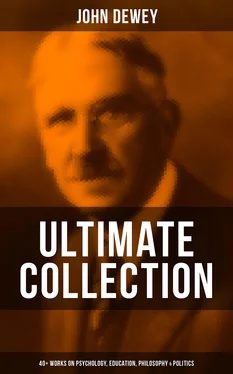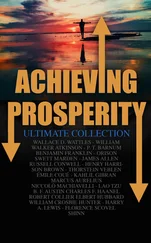The deeper and more intimate educative formation of disposition comes, without conscious intent, as the young gradually partake of the activities of the various groups to which they may belong. As a society becomes more complex, however, it is found necessary to provide a special social environment which shall especially look after nurturing the capacities of the immature. Three of the more important functions of this special environment are: simplifying and ordering the factors of the disposition it is wished to develop; purifying and idealizing the existing social customs; creating a wider and better balanced environment than that by which the young would be likely, if left to themselves, to be influenced.
Chapter Three:
Education as Direction
Table of Contents
1. The Environment as Directive.
We now pass to one of the special forms which the general function of education assumes: namely, that of direction, control, or guidance. Of these three words, direction, control, and guidance, the last best conveys the idea of assisting through cooperation the natural capacities of the individuals guided; control conveys rather the notion of an energy brought to bear from without and meeting some resistance from the one controlled; direction is a more neutral term and suggests the fact that the active tendencies of those directed are led in a certain continuous course, instead of dispersing aimlessly. Direction expresses the basic function, which tends at one extreme to become a guiding assistance and at another, a regulation or ruling. But in any case, we must carefully avoid a meaning sometimes read into the term "control." It is sometimes assumed, explicitly or unconsciously, that an individual's tendencies are naturally purely individualistic or egoistic, and thus antisocial. Control then denotes the process by which he is brought to subordinate his natural impulses to public or common ends. Since, by conception, his own nature is quite alien to this process and opposes it rather than helps it, control has in this view a flavor of coercion or compulsion about it. Systems of government and theories of the state have been built upon this notion, and it has seriously affected educational ideas and practices. But there is no ground for any such view. Individuals are certainly interested, at times, in having their own way, and their own way may go contrary to the ways of others. But they are also interested, and chiefly interested upon the whole, in entering into the activities of others and taking part in conjoint and cooperative doings. Otherwise, no such thing as a community would be possible. And there would not even be any one interested in furnishing the policeman to keep a semblance of harmony unless he thought that thereby he could gain some personal advantage. Control, in truth, means only an emphatic form of direction of powers, and covers the regulation gained by an individual through his own efforts quite as much as that brought about when others take the lead.
In general, every stimulus directs activity. It does not simply excite it or stir it up, but directs it toward an object. Put the other way around, a response is not just a re-action, a protest, as it were, against being disturbed; it is, as the word indicates, an answer. It meets the stimulus, and corresponds with it. There is an adaptation of the stimulus and response to each other. A light is the stimulus to the eye to see something, and the business of the eye is to see. If the eyes are open and there is light, seeing occurs; the stimulus is but a condition of the fulfillment of the proper function of the organ, not an outside interruption. To some extent, then, all direction or control is a guiding of activity to its own end; it is an assistance in doing fully what some organ is already tending to do.
This general statement needs, however, to be qualified in two respects. In the first place, except in the case of a small number of instincts, the stimuli to which an immature human being is subject are not sufficiently definite to call out, in the beginning, specific responses. There is always a great deal of superfluous energy aroused. This energy may be wasted, going aside from the point; it may also go against the successful performance of an act. It does harm by getting in the way. Compare the behavior of a beginner in riding a bicycle with that of the expert. There is little axis of direction in the energies put forth; they are largely dispersive and centrifugal. Direction involves a focusing and fixating of action in order that it may be truly a response, and this requires an elimination of unnecessary and confusing movements. In the second place, although no activity can be produced in which the person does not cooperate to some extent, yet a response may be of a kind which does not fit into the sequence and continuity of action. A person boxing may dodge a particular blow successfully, but in such a way as to expose himself the next instant to a still harder blow. Adequate control means that the successive acts are brought into a continuous order; each act not only meets its immediate stimulus but helps the acts which follow.
In short, direction is both simultaneous and successive. At a given time, it requires that, from all the tendencies that are partially called out, those be selected which center energy upon the point of need. Successively, it requires that each act be balanced with those which precede and come after, so that order of activity is achieved. Focusing and ordering are thus the two aspects of direction, one spatial, the other temporal. The first insures hitting the mark; the second keeps the balance required for further action. Obviously, it is not possible to separate them in practice as we have distinguished them in idea. Activity must be centered at a given time in such a way as to prepare for what comes next. The problem of the immediate response is complicated by one's having to be on the lookout for future occurrences.
Two conclusions emerge from these general statements. On the one hand, purely external direction is impossible. The environment can at most only supply stimuli to call out responses. These responses proceed from tendencies already possessed by the individual. Even when a person is frightened by threats into doing something, the threats work only because the person has an instinct of fear. If he has not, or if, though having it, it is under his own control, the threat has no more influence upon him than light has in causing a person to see who has no eyes. While the customs and rules of adults furnish stimuli which direct as well as evoke the activities of the young, the young, after all, participate in the direction which their actions finally take. In the strict sense, nothing can be forced upon them or into them. To overlook this fact means to distort and pervert human nature. To take into account the contribution made by the existing instincts and habits of those directed is to direct them economically and wisely. Speaking accurately, all direction is but re-direction; it shifts the activities already going on into another channel. Unless one is cognizant of the energies which are already in operation, one's attempts at direction will almost surely go amiss.
On the other hand, the control afforded by the customs and regulations of others may be short-sighted. It may accomplish its immediate effect, but at the expense of throwing the subsequent action of the person out of balance. A threat may, for example, prevent a person from doing something to which he is naturally inclined by arousing fear of disagreeable consequences if he persists. But he may be left in the position which exposes him later on to influences which will lead him to do even worse things. His instincts of cunning and slyness may be aroused, so that things henceforth appeal to him on the side of evasion and trickery more than would otherwise have been the case. Those engaged in directing the actions of others are always in danger of overlooking the importance of the sequential development of those they direct.
Читать дальше












